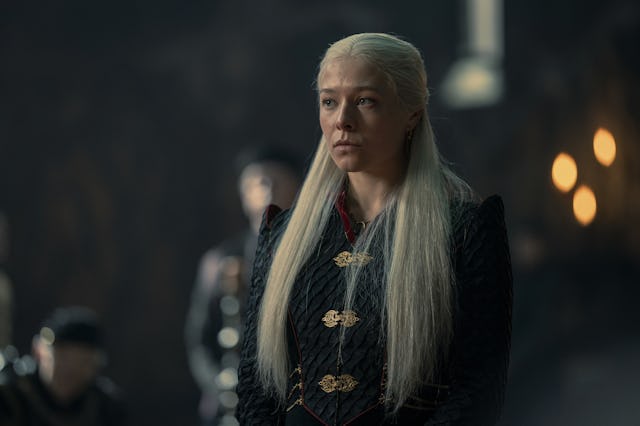'House Of The Dragon' Star Emma D'Arcy Reacts To Criticism Of Graphic Birth Scenes
The actor says they "take real issue with the idea that we shouldn't see women in labor depicted with gritty realism, and blood, and placentas."

Spoilers ahead for House of the Dragon. You’ve been warned.
On Sunday, House of the Dragon Season 1 earned HBO its biggest finale audience since the series finale of its predecessor, Game of Thrones — which means nearly 10 million people watched a heart-wrenching stillbirth scene that caused a bit of a raucous.
Some viewers were upset that there was no trigger warning ahead of the episode; others championed the medieval-fantasy series for showing the history, and grim reality, of childbirth.
House of the Dragon star Emma D’Arcy, who plays lead Rhaenyra Targaryen, is one of the supporters of the scene. The non-binary actor shared their thoughts on the criticism surrounding the show’s graphic birth scenes with British GQ, explaining that, as the script read, “the birthing bed is our [women’s] battlefield.”
“I haven't seen loads of [criticism] to be honest. But I take real issue with the idea that we shouldn't see women in labor depicted with gritty realism, and blood, and placentas. Especially on a show where part of its USP [unique selling point] is big, gory battle sequences,” D’Arcy said of the show’s four traumatic childbirth scenes in the season’s 10 episodes.
“What it feels like is that we want women to conform to a certain image. Which is interesting, insofar as acting is concerned, because, there's also a lot of fun to be had getting to do the big physical, physically demanding sequences. And it's interesting that maybe sometimes that is not afforded to female characters,” they added.
House of the Dragon’s season finale earned the network’s biggest audience in years.
In the finale scene in question, Rhaenyra finds out her father, King Viserys (Paddy Considine), has died and that her half-brother Aegon Targaryen (Tom Glynn-Carney) has usurped the Iron Throne, despite her being the legitimate heir. Due to the situation, she goes into premature labor and chooses to deliver her baby rather than listening to the pleas of her midwives.
Rhaenyra, shrieking in pain, pulls a stillborn from her body and cradles the lifeless child in her arms as her husband, Daemon (Matt Smith) — who witnessed the loss of another baby and his wife earlier in the season — does nothing. The baby’s body is cremated as part of Targaryen tradition, and the family moves on with its war plots.
To D’Arcy, however, this moment is huge for character development and introduces how grief will impact Rhaenyra moving forward. The queen lost her mother, Aemma (Sian Brooke), in childbirth, just received news of her father’s death and, later in the finale, hears her teenage son, Lucerys (Elliot Grihault), has been killed by enemy forces.
“I don’t know how contentious this is going to be, but the most important thing for me about the birth in Episode 10, is that … She has a fear that begins when she loses her mother. And that's one of either dying in childbirth, and/or being incapacitated by childbirth by being forced to bear children within this system. Simultaneously, she lives in anticipation of this call to the throne when her father dies. But she’s in the worst-case scenario, in that she is fundamentally incapacitated at the same point as being told ‘your father’s dead, the throne is yours, and you’ve been usurped,’” D’Arcy explained.
“The advice Rhaenyra is receiving is to have patience, in the hope of preventing the child being stillborn or preventing harm to the child. And she ignores the advice, seeking instead to get this body out of her. And I think it's really fundamental, and it will be possibly divisive, but ultimately I think she chooses her own bodily autonomy. She prioritizes her own bodily autonomy. She literally says in the scene, like ‘get it out.’”
When the GQ interviewer insisted that point was “heavy,” D’Arcy doubled down, saying, “Somehow this sort of psychic trauma is also like a bodily trauma and the tearing is happening both within the psyche and also within the body.”
D’Arcy says that now that Rhaenyra has lost her mother, father, and two children, she is “well-educated in grief,” which will impact her character arc in the upcoming seasons.
As for the show’s harrowing depiction of birth, House of the Dragon showrunner Miguel Sapochnik previously told The Hollywood Reporter that the showrunners wanted to explore the idea that “giving birth is violence” in medieval times.
“It’s as dangerous as it gets,” he said. “You have a 50/50 chance of making it. Many women didn’t. If given the choice, the father would choose the child over the mother as a cesarean would kill you. It was an extremely violent part of life. We have a number of births in the show and basically decided to give them different themes and explore them from different perspectives the same way I did for a bunch of battles on Thrones, where each time I tried to put a different spin on each so it wasn’t just doing the same thing, as I don’t think putting a bunch of violence onscreen for the sake of violence does any good in the world.”
A trigger warning couldn’t hurt when dealing with pregnancy and infant loss, but it’s also been eye-opening to see authentic, historical labor and delivery stories told on screen.